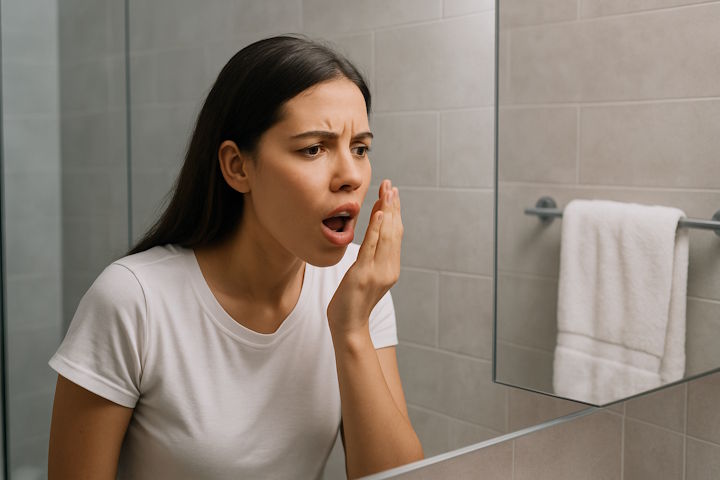
Why Do I Have Bad Breath? What It Means and What You Can Do About It

Bad breath, or halitosis, happens to everyone at some point. Whether it’s morning breath or something more persistent, it’s not just uncomfortable, it can be a sign of deeper dental issues. And when it sticks around even after brushing? That’s your body waving a red flag.
So what’s really behind it? And when should you talk to your dentist?
Let’s break it down.
What Causes Bad Breath?
The most common cause is bacteria. When food particles linger in your mouth, between teeth, along the gumline, or on your tongue, bacteria feed on them and produce sulfur compounds. That’s what creates that bad odor.
But it’s not always about what you eat. Sometimes, chronic bad breath points to something more serious.
Could It Be Gum Disease?
Yes. In fact, gum disease (also called periodontitis) is one of the biggest hidden causes of bad breath.
Here’s what happens:
- Plaque builds up under the gums
- Gums get irritated and start to pull away from the teeth
- Pockets form between your teeth and gums
- Those pockets trap bacteria and even pus
- The result? A strong, unpleasant smell that brushing alone won’t fix
If your gums bleed when you brush, or you notice a sour or metallic taste in your mouth, it’s time to get checked.
Other Reasons for Bad Breath
Bad breath can also come from:
- Dry mouth (especially if you breathe through your mouth or take certain medications)
- Tonsil stones
- Acid reflux
- Smoking
- Poorly cleaned dental appliances (like retainers or dentures)
- Skipping flossing. Yes, even if you brush
And occasionally, it’s linked to sinus infections or other health issues. That’s why a full dental exam is often the best first step.
How to Get Rid of Bad Breath
Here’s what really works, beyond gum or mints:
- Brush twice a day, including your tongue
- Floss daily - bad breath often hides between teeth
- Drink more water, especially if your mouth feels dry
- Use an alcohol-free mouthwash with antibacterial ingredients
- Don’t skip checkups - your dentist can catch problems early
- Ask about a professional cleaning if it’s been more than six months
If your dentist finds signs of gum disease or another underlying issue, they’ll help you treat it directly, so you’re not just masking the problem.
When Should You See a Dentist?
If your bad breath sticks around for more than a day or two, even after brushing, flossing, and drinking more water, it’s time to schedule a visit. Persistent halitosis isn’t something to ignore. It could be a sign of early gum disease or another treatable condition.
Let's Tackle Bad Breath Together
You don’t have to live with halitosis. If you’re noticing it more often, or someone close to you has mentioned it, we’re here to help, not judge. Call us or book online to schedule a visit. Let’s figure out what’s going on and get your smile (and your breath) back on track.
Feel more confident and show off a beautiful, brand new smile. Zoom teeth whitening in Miami helps patients look younger and more refreshed. Call our office today at 305-894-3083 if you want to learn more about professional whitening.


